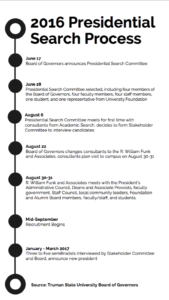Choosing the next president of Truman State University is an important decision for our community. Whoever is chosen will have to handle our new sexual assault policies, growing concerns over mental health, systemic discrimination and a budget that receives less money from the state now than in 2001. While former University President Troy Paino made progress on all these issues, there is still a lot of work to do by students, faculty and our future leadership. However, much of the presidential search process has been conducted by top levels of the administration — without much input from students and faculty.
We, the Truman Media Network Editorial Board, understand the necessity of keeping some parts of this process private, but believe our community would benefit from having greater campus participation and transparency. The current search committee is using a private consultation firm, R. William Funk and Associates, to canvas the entire country for Paino’s replacement. Keeping the candidates anonymous increases the amount of people there are to choose from because many candidates will only express interest if their employers are unaware they are considering a new job. These benefits should not be undervalued, but we are skeptical of this method given Truman’s liberal arts mission and tight-knit, small-town nature. Other colleges focus on technical training, have a large population, or specialize in specific fields like STEM and might need the largest pool of candidates possible — small liberal arts colleges serve a different purpose. We are also concerned with how the candidates’ secrecy affects their home campuses when they leave, as we recently had to deal with the shock and surprise of Paino’s departure.
Part of what made Paino a popular president was his familiarity with the community before he became president. If the next president does not come from our own ranks, or has never even visited campus, their familiarity with Truman will have to develop after they assume presidency. Students in liberal arts colleges are intentionally exposed to a wide variety of subjects and methods of inquiry with the hope that we become well-rounded citizens. Presidents’ willingness to submerge themselves in student life is more highly valued by our community than other universities for this reason. Students were able to interact with Paino in real life, from his scheduled open dining hall meals to his JINS class on higher education and democracy. Allowing input from students, faculty and staff is key to making these kinds of traits valued in the search process. This would balance out other interests represented on the search committee that are concerned with running the University, like the Board of Governors and School of Business.
The search committee allowed some feedback from the Truman community several weeks ago during an open forum with R. William Funk and Associates. However, the only large-scale advertising for the event was an email sent out one week in advance. We, the Truman Media Network Editorial Board, do not believe this was enough of an effort on the part of the committee to get students aware and interested in the event. The forum was also hosted at an inconvenient time — 4:30 on a Tuesday, when many have classes — which further discouraged students from participating. Even students who showed up served only an advisory role, and their opinions are not binding to the final decision of the search committee and consultants.
We, the Truman Media Network Editorial Board, believe students, faculty and staff should have more knowledge about and influence in the selection of the next president. According to our University vision statement, Truman’s purpose is to “[develop] educated citizens needed to protect our democracy and offer creative solutions to local, state, national, and global problems.” Having binding input in the presidential selection process would improve the final decision, and give students real-world practice in making societal decisions. We are searching for a president — not a dictator or boss — and being in the loop during their selection is the best way to ensure the next administration starts off well.

